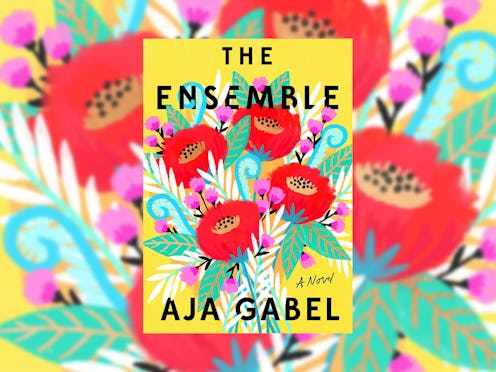
The cover for Aja Gabel's new novel The Ensemble is an image of perfect happiness — vibrant flowers in vermillion, fuchsia, turquoise, and sea-foam green are painted upon a bright yellow background. Unsurprisingly, the novel within the covers is one about happiness and the uncertain, painful, and redeeming experience of finding it and keeping it.
The Ensemble follows the lives of four chamber musicians — Henry, a handsome violist who is widely believed to be too talented to dedicate his life to an ensemble; Jana, a diligent, responsible, but often outwardly cold violinist; Brit, a hopelessly romantic and effervescently sweet second violinist; and Daniel, the grouchy, exasperated, and stubbornly pessimistic cellist. Over the course of several decades, these friends and colleagues fall in love (occasionally with each other), fall out of love, have children, get married, move across the country and back again, and attempt to find some rhythm in their lives through the music they create together.
The novel cycles through each of their perspectives, and not shockingly, it is Brit, the most outwardly optimistic of the quartet, who truly challenged my ideas about heartbreak through her perspective on a failed almost-but-not-quite relationship with Daniel.
The Ensemble by Aja Gabel, $16, Amazon
To summarize the situation: Brit gets dumped by Daniel right before they can make the shift into something a little more serious than nightly hookups. She certainly isn't the first — not the last — woman to find herself in this situation, but her takeaways from this little heartbreak are utterly refreshing. Gabel writes:
"Of course it's a love story, thought Brit, though she thought everything was. This note here, and this one, this joyful countermelody, her second violin harmony, the collective intangible, the audible agreement. Her relationship with Daniel, which he'd rather coldly cut off a few days ago. Even the absence of love was a love story for her. Even this pain, this suffering. It was useful. Though she imagined one day no longer needing to know that, or she fantasized about rewinding life and starting over so she was a person who did not have to know that, or she entertained the idea of a parallel Brit, living in a world in which there was no need to make sense of a man who up and left on the brink of love, of people who up and left, of a life strung together with all these little leavings, but she felt sad for this parallel Brit, an emptier sadness than she felt for herself now. They were all love stories."
Yes, sure, it is nearly impossible to be this wildly optimistic after a heartbreak, but there is something incredibly reassuring about the idea that even the loss of love is part of the grander love story that is your life. All of these comings and goings are part of one's becoming, and life would be less painful but less fulfilling without them. The person may be gone, but the love is not. It carries on; it continues winding its way through your story.
That period after any breakup is one of intense emotional upheaval. There's sadness, of course, and anger, and jealousy. But there's also a feeling of absolute clarity: You can reinvent yourself; you can figure out what you want next; you can decide what kind of love you will aim to give in the future and what kind of love you will aim to receive. It might be difficult truth to swallow in the short-term, but from the long-view, Brit's perspective is mightily romantic: every heartbreak, every disappointment is a love story, too.